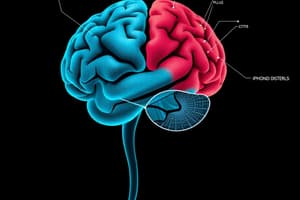Podcast
Questions and Answers
Which disorder is characterized by a disregard for and violation of the rights of others?
Which disorder is characterized by a disregard for and violation of the rights of others?
- Borderline Personality Disorder
- Schizoid Personality Disorder
- Obsessive-Compulsive Personality Disorder
- Antisocial Personality Disorder (correct)
Which of the following is true about the DSM categories of mental disorders?
Which of the following is true about the DSM categories of mental disorders?
- Bipolar Disorder Type 1 is characterized by at least one manic episode. (correct)
- Neurodevelopmental disorders do not encompass intellectual disabilities.
- Bipolar Disorder Type 2 includes at least one full manic episode.
- Schizophrenia includes only positive symptoms such as hallucinations.
What type of disorder involves persistent sexual interests or behaviors that provoke distress or impairment?
What type of disorder involves persistent sexual interests or behaviors that provoke distress or impairment?
- Mood disorders
- Impulse-control disorders
- Paraphilic disorders (correct)
- Substance-related disorders
What distinguishes Bipolar Disorder Type 2 from Type 1?
What distinguishes Bipolar Disorder Type 2 from Type 1?
Which behavior deviation is characterized by setting fires?
Which behavior deviation is characterized by setting fires?
Which of the following symptoms is NOT associated with schizophrenia spectrum disorders?
Which of the following symptoms is NOT associated with schizophrenia spectrum disorders?
Gender dysphoria is primarily compounded by which of the following feelings?
Gender dysphoria is primarily compounded by which of the following feelings?
Which of the following definitions best describes a mental disorder?
Which of the following definitions best describes a mental disorder?
Which of the following is NOT classified as a substance-related disorder?
Which of the following is NOT classified as a substance-related disorder?
What age does early onset neurodevelopmental disorder typically refer to?
What age does early onset neurodevelopmental disorder typically refer to?
Which personality disorder is characterized by an excessive need for admiration and a lack of empathy?
Which personality disorder is characterized by an excessive need for admiration and a lack of empathy?
Which of the following statements about cyclothymic disorder is correct?
Which of the following statements about cyclothymic disorder is correct?
What is a common symptom of neurocognitive disorders like Alzheimer's disease?
What is a common symptom of neurocognitive disorders like Alzheimer's disease?
Delusions in schizophrenia are best described as:
Delusions in schizophrenia are best described as:
Which of the following personality disorders demonstrates a pattern of submissive behavior?
Which of the following personality disorders demonstrates a pattern of submissive behavior?
Which classification of disorders includes motor coordination disorders?
Which classification of disorders includes motor coordination disorders?
Medication-induced movement disorders are most likely to be caused by which type of medications?
Medication-induced movement disorders are most likely to be caused by which type of medications?
Which disorder is associated with acute discomfort in close relationships and distortions in perception and cognition?
Which disorder is associated with acute discomfort in close relationships and distortions in perception and cognition?
Which symptom is NOT typically associated with depressive disorders?
Which symptom is NOT typically associated with depressive disorders?
What is a distinguishing feature of obsessive-compulsive disorder (OCD)?
What is a distinguishing feature of obsessive-compulsive disorder (OCD)?
Which condition is specifically associated with a marked disturbance in awareness and identity?
Which condition is specifically associated with a marked disturbance in awareness and identity?
Which type of anxiety disorder is characterized by fear related to impending threats?
Which type of anxiety disorder is characterized by fear related to impending threats?
What best describes body dysmorphic disorder?
What best describes body dysmorphic disorder?
Which disorder is characterized by extreme difficulty sleeping or staying awake?
Which disorder is characterized by extreme difficulty sleeping or staying awake?
What is a common symptom of narcolepsy?
What is a common symptom of narcolepsy?
Which feeding and eating disorder involves the consumption of non-nutritive objects?
Which feeding and eating disorder involves the consumption of non-nutritive objects?
Which condition is often found in individuals who have experienced sexual assault or trauma?
Which condition is often found in individuals who have experienced sexual assault or trauma?
Which type of disorder involves patterns of excess weight followed by emotional distress?
Which type of disorder involves patterns of excess weight followed by emotional distress?
What best describes restlessness in the leg that typically worsens during inactivity?
What best describes restlessness in the leg that typically worsens during inactivity?
Which disorder is characterized by compulsive behaviors such as hoarding?
Which disorder is characterized by compulsive behaviors such as hoarding?
What describes a characteristic of conversion disorder?
What describes a characteristic of conversion disorder?
What is a common feature of general anxiety disorder?
What is a common feature of general anxiety disorder?
Flashcards are hidden until you start studying
Study Notes
Types of Psychopathologies
- Classification of mental disorders is done using standardized manuals such as ICD-11 by WHO and DSM by APA.
- A mental disorder is defined as a syndrome characterized by significant disturbances in cognition, emotion, or behavior reflecting dysfunction in psychological or biological processes.
- Mental disorders can cause distress or impairment in social and occupational activities.
Categories in DSM
-
Neurodevelopmental Disorders:
- Present from early development, includes:
- Intellectual disability
- Communication disorders
- Autism spectrum disorders (new in DSM-V)
- Motor coordination disorders
- Present from early development, includes:
-
Schizophrenia Spectrum and Other Psychotic Disorders:
- Encompasses abnormalities in cognition and behavior such as:
- Delusions (fixed beliefs despite contrary evidence)
- Hallucinations (perceptions without stimuli)
- Disorganized thinking
- Abnormal motor behavior
- Disorders include schizotypal personality disorder and schizophrenia.
- Encompasses abnormalities in cognition and behavior such as:
-
Bipolar and Related Disorders:
- Characterized by mood state shifts:
- Bipolar Type I: At least one manic episode.
- Bipolar Type II: At least one hypomanic and one major depressive episode without full manic episodes.
- Cyclothymic disorder: Mild fluctuations in mood lasting at least two years.
- Characterized by mood state shifts:
-
Depressive Disorders:
- Symptoms include low mood, changes in sleep/eating patterns, lack of motivation.
- Types encompass major depressive disorder, persistent depressive disorder (dysthymia), and premenstrual dysphoric disorder.
-
Anxiety Disorders:
- Types include:
- Separation anxiety disorder
- Specific phobias
- Social anxiety disorder
- Panic disorder
- Generalized anxiety disorder
- Anxiety is an anticipatory response, while fear is a reaction to immediate threats.
- Types include:
-
Obsessive-Compulsive and Related Disorders:
- Primarily includes OCD, body dysmorphic disorder, and hoarding disorder.
-
Trauma- and Stressor-Related Disorders:
- Includes PTSD, acute stress disorder, and reactive attachment disorder.
- Associated with severe stress or trauma.
-
Dissociative Disorders:
- Includes dissociative identity disorder and depersonalization/derealization disorder, often related to trauma.
-
Somatic Symptom and Related Disorders:
- Individuals experience pain and fatigue without clear physiological causes.
- Types include somatic symptom disorder and conversion disorder.
-
Feeding and Eating Disorders:
- Affect dietary behavior; types include anorexia nervosa, bulimia nervosa, and binge-eating disorder.
-
Elimination Disorders:
- Enuresis (urine expulsion issues) and encopresis (fecal expulsion issues).
-
Sleep-Wake Disorders:
- Includes insomnia, hypersomnolence, narcolepsy, and night terrors.
-
Sexual Dysfunctions:
- Disorders affecting sexual performance, such as erectile dysfunction and premature ejaculation.
-
Gender Dysphoria:
- Discontent with assigned gender leading to distress; may co-occur with anxiety or depression.
-
Disruptive, Impulse-Control, and Conduct Disorders:
- Involve behavioral deviations, including pyromania and oppositional defiant disorder.
-
Substance-Related and Addictive Disorders:
- Involves addiction and withdrawal symptoms from substances like alcohol and opioids, as well as non-substance-related disorders like gambling addiction.
-
Neurocognitive Disorders:
- Cognitive impairments associated with neurodegenerative diseases like Alzheimer’s.
-
Personality Disorders:
- Features enduring patterns of behavior inflexible to cultural norms, including:
- Paranoid personality disorder
- Borderline personality disorder
- Narcissistic personality disorder
- Features enduring patterns of behavior inflexible to cultural norms, including:
-
Paraphiliac Disorders:
- Characterized by atypical sexual interests causing distress or potential harm to others.
-
Other Mental Disorders:
- Including medication-induced movement disorders caused by certain medications.
Extra Notes
- Diagnosis and classification are essential for understanding and treating mental health conditions.
- Disorders can overlap in symptoms, requiring careful evaluation for accurate diagnosis.
Studying That Suits You
Use AI to generate personalized quizzes and flashcards to suit your learning preferences.




